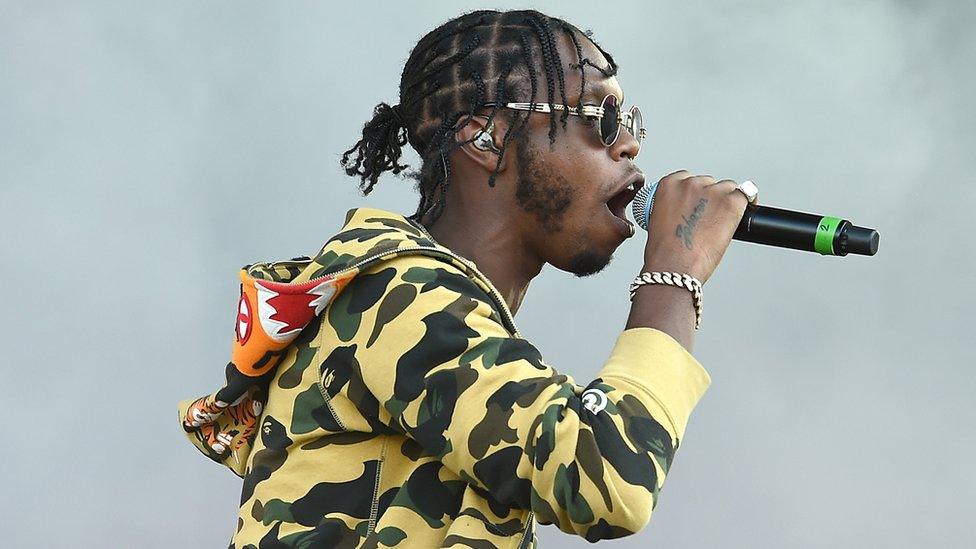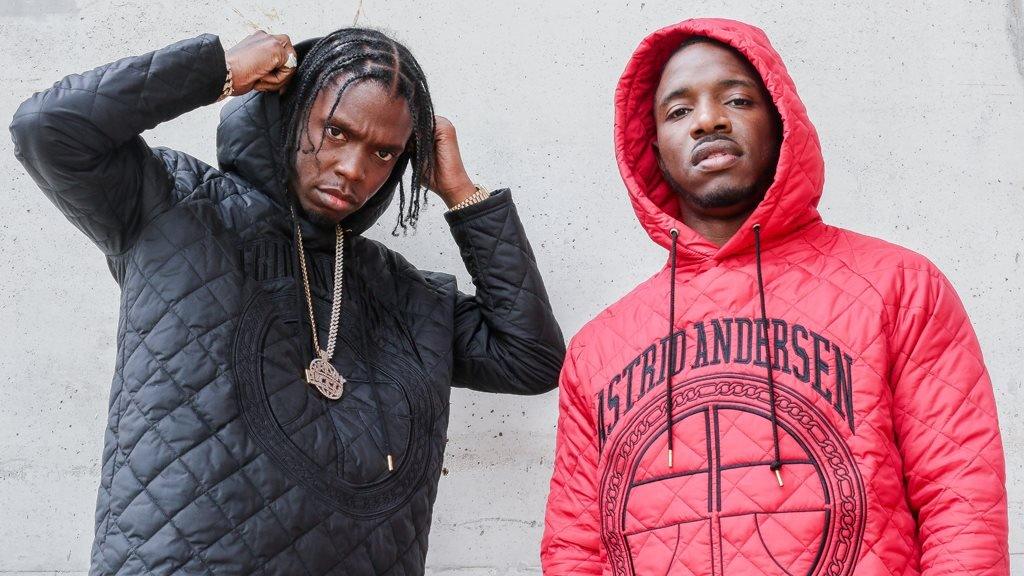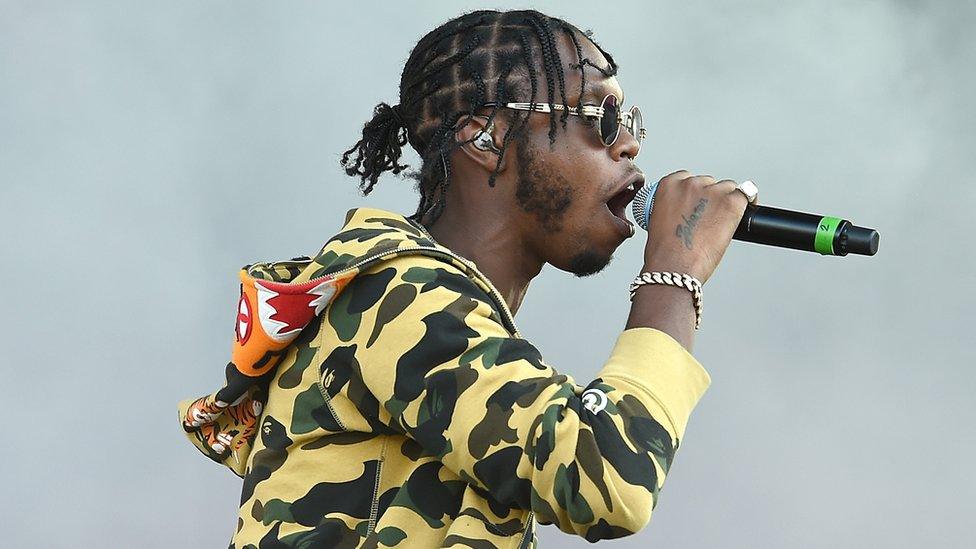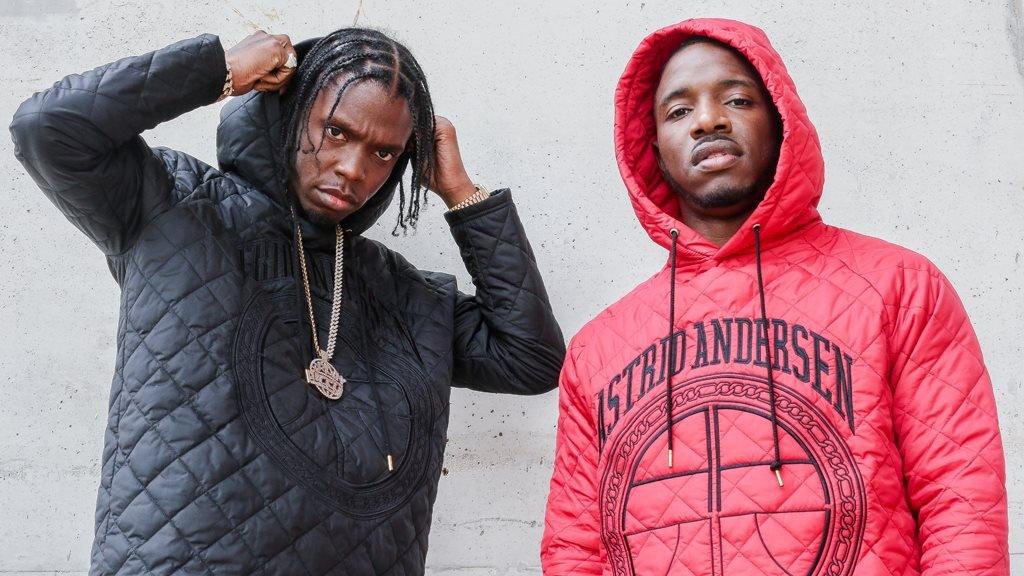Krept: 'Knife wound was 1mm away from being fatal'
- Published
Krept: I'm staying positive after knife attack
Rap star Krept says he nearly lost his life after being attacked backstage at a BBC Radio 1Xtra gig in Birmingham.
The star, whose real name is Casyo Johnson, was left with slash wounds in the leg and neck after the incident.
"I got a report back saying if [the blade] was a millimetre deeper, it could have been fatal," he told the BBC's Victoria Derbyshire programme.
"I'm just grateful to even be here. It could have been a lot worse," he added. "Thank God."
The star is one half of the grime duo Krept & Konan. They had been due to perform at 1Xtra Live at the Birmingham Arena on 5 October; but the concert was called off after the violence.
Backstage footage at 1Xtra Live
The stars subsequently postponed their tour to allow Krept to recover, but the 29-year-old said he wouldn't let the injury affect their career.
"I'm fine, I'm good," he said. "I'm still going to get on with it... We're still going to do positive things and let people know that, no matter what happens, you can get through it."
Mental health message
The duo appeared on the Victoria Derbyshire programme to discuss their new album, Revenge Is Sweet.
It's a record that showcases their breadth and versatility, from the bristling confidence of the opening track, Goat Level, to the cathartic closer, Broski, external - a tribute to their friend and business partner, Nash Chagonda, who tragically took his own life last year.
The duo said the song was written to "change the perspective" on mental health.

"I feel like a lot of people suffer from it, but they keep it to themselves," said Konan, whose real name is Karl Wilson.
"A lot of people aren't confident to reach out and talk about what they're going through. So if you're listening to our music and you hear us talking about it, maybe it'll make you think, 'The people I look up to are talking about it, so I don't [need to] feel scared'."
"We have to spread this message and let people know it's OK to talk," added Krept.
"Let people know. There's someone in your life that's definitely willing to help. Nobody wants anybody to commit suicide."

Krept and Konan say Drill can provide young people with a route out of violence
The band were dealt a second blow earlier this year, when Krept's cousin Blaine Johnson was killed in a car accident while travelling to a gig in Staffordshire.
Blaine, who was 28, performed under the name Cadet, and had just scored his first Top 20 single before he died.
"We was inseparable, we grew up together, we had the same dream of making music," said Konan. "It was very hard to get through it."
"We have a group chat and we used to banter every day. And now they [Nash and Blaine] are not here, but you go in the group chat and their names are still in the group chat and it feels so weird."
He said losing two of his closest friends had overshadowed the making of his own record, but the band resolved to be positive.
"We said, 'We are going to keep his name alive and we're gonna do this for him and continue his dream. And that is what motivated us to get through to finishing the album."
Drill ban is 'lazy'
The band hit the headlines earlier this year with the release of a short film, Ban Drill, that argued against a police initiative that requires social media companies to delete drill videos that are found to encourage violence.
"If it is inciting or glamorising violence, then we think they have a social responsibility to work with us to take those videos down," Met Commissioner Cressida Dick explained.
Krept and Konan said that logic was "just lazy," and failed to tackle "the actual root" of violence in deprived areas of London.
In response, the duo have set up the Positive Direction Foundation, which provides after-school activities in an effort for teenagers.
"We've gone to the heart of where everything's happening," said Konan. "We've gone to the kids, and tried to help them, give them something to do after school and distract them from that kind of life."
"When we was getting in trouble when we was younger, what would have happened if they'd banned our music?" added Krept. "We wouldn't be here, setting up foundations, changing our lives, changing our perspectives.
"You've got to take people out of these situations to change their situation.
"We want to get to the actual root of what the issue is, rather than just saying just 'ban the music'."

Follow us on Facebook, external, or on Twitter @BBCNewsEnts, external. If you have a story suggestion email entertainment.news@bbc.co.uk, external.
- Published25 October 2019

- Published14 June 2019
